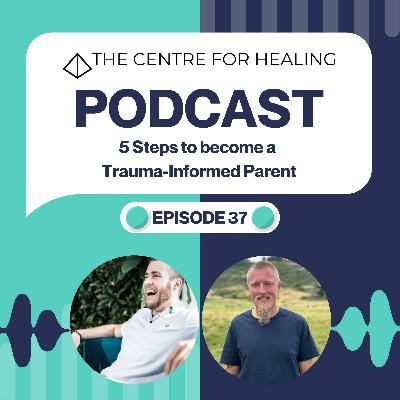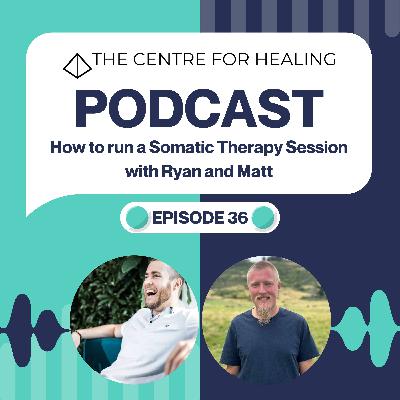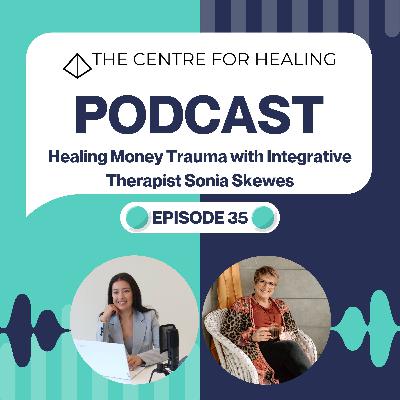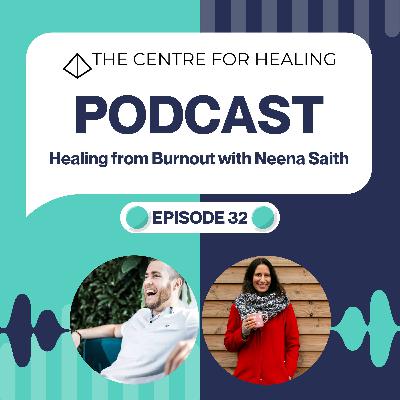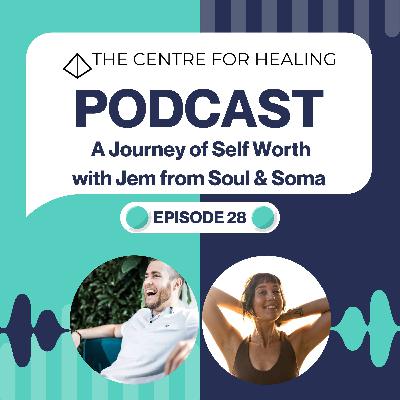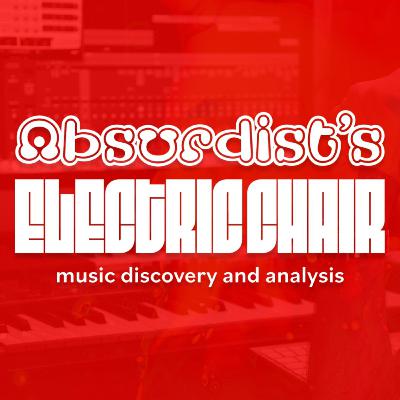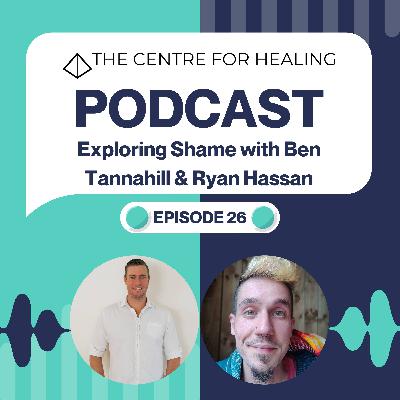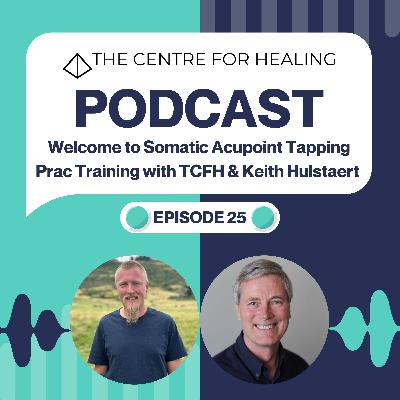Discover The Centre for Healing Podcast
The Centre for Healing Podcast

The Centre for Healing Podcast
Author: Ryan Hassan, Melissa Hiemann & Matt Kay
Subscribed: 7Played: 141Subscribe
Share
Description
Welcome to The Centre for Healing Podcast, where we dive deep into the world of emotional, mental, and spiritual well-being. Brought to you by The Centre for Healing, this podcast features expert insights, transformative stories, and practical tools for overcoming trauma, fostering resilience, and embracing holistic healing.
Whether you’re on your own healing journey or supporting others in theirs, each episode is designed to inspire growth, spark self-discovery, and empower you to live a balanced, thriving life. Tune in and join the conversation as we explore the many paths to true healing and wholeness.
42 Episodes
Reverse
In this episode of The Centre for Healing Podcast, Mel sits down with Valery Alignment—a multidisciplinary practitioner, mentor, and teacher—for a heartfelt, wide-ranging conversation that feels like two friends having coffee. Together, they explore what it really means to live and work as a trauma-informed practitioner, especially when your life is full (motherhood, business, healing work) and your nervous system is your most important tool.
Key topics & takeaways (bullet points)
Adult friendships and why healing can change your social circle
Why practitioners must develop stronger boundaries (time, energy, identity)
Pricing and charging as a nervous system and values conversation (not hourly worth)
Agency and sovereignty: trauma-informed work means respecting the client’s deeper “yes/no”
Nervous system + energetics: two expressions of the same system (the “antenna”)
The myth of “love and light” and why anger can be constructive and healthy
React vs respond: creating a pause before action
“You are the niche”: competition narratives dissolve when you embody your unique signature
Mentorship matters: self-awareness grows, but blind spots remain
Valerie’s program: The Holistic Human (Practice mastery, self-mastery, intuition mastery)
Guest bioValery is a holistic teacher, guide, and founder of Valery Alignment. Her work sits at the intersection of applied psychology, spirituality, emotional development, and energetic mastery. She supports practitioners, self-healers, and leaders in understanding human patterns, dismantling internal blocks, and aligning their lives and work with truth, integrity, and purpose. Valery is the creator of The Holistic Human and PostureCraft™️, and teaches through systems she has lived, tested, and embodied—bringing depth, clarity, and structure to inner work beyond trends or surface-level healing.
Links:
Website:
https://www.valeryalignment.au/
VA IG: https://www.instagram.com/valery.alignment/
PC IG: https://www.instagram.com/posture_craft/
The Holistic Human, designed to support practitioners to deepen their skills and self-mastery through three pillars:https://www.valeryalignment.au/the-holistic-human-2026
Trauma-Aware Parenting - https://www.thecentreforhealing.com/trauma-aware-parenting
Find out more about The Centre for Healing and explore our trainings here - https://www.thecentreforhealing.com/
Show Notes: Healing with Pets and Humans
Guest: Fabienne Wydler
In this heartfelt conversation, we explore the powerful and often overlooked relationship between humans and their animal companions—and how healing can unfold on both sides of the leash.
Key Takeaways:
Our pets often mirror unresolved emotions, unexpressed needs, and weakened boundaries in their human companions, gently holding space for what wants to be seen and healed.
Deepening your connection and attunement with your pet can offer profound insights into your own emotional world, supporting personal growth and transformation.
Animals provide a non-judgemental, emotionally safe presence—particularly supportive for neurodivergent children who may find it easier to express themselves with animals than with people.
Behavioural challenges in pets (such as anxiety, aggression, or destructiveness) often point to deeper emotional or relational dynamics within the human–animal bond. Healing the root cause can create lasting change for both.
Resources Mentioned:
Fabienne Wydler’s website: fabiennewydler.com
Free booklet on emotional mirroring: Available for download via Fabienne’s website
Connect with Fabienne:
Instagram: @healingwithfabienne
YouTube: Heal With Animals
Facebook Group: Heal With Animals
Podcast Episode: Exploring and Inquiring into Parts
Guests: Ryan Hassan & Matt Kay
Episode Overview
In this insightful episode, Ryan Hassan and Matt Kay guide listeners through the fascinating world of parts work, explaining how different aspects of ourselves form, interact, and influence our behaviours. They share practical tools for relating to these parts with curiosity and compassion, as well as embodied techniques for deeper self-exploration.
Key Topics Covered
1. Understanding Parts
What are "parts" and how do they form?
How parts develop as coping mechanisms during childhood experiences and challenging environments.
Understanding internal conflicts and self-sabotaging behaviours that arise when parts are in opposition.
2. Relating to Parts
Adopting a compassionate and curious approach to your parts.
Welcoming all parts of yourself—even those you may dislike or want to suppress.
Recognising that parts are aspects of yourself, not separate entities.
3. Embodied Inquiry
Exploring parts through embodied inquiry, a somatic, felt-sense method.
Sample inquiry questions:
When did this part first emerge?
How has it served or sabotaged you?
What does it believe about you or the world?
What does it need, and what would happen if it weren’t present?
Key Insights & Takeaways
Parts are often created as survival mechanisms, helping maintain autonomy and connection, particularly after developmental trauma or a lack of safety and empathy.
Healing involves integration and wholeness, where all parts are acknowledged and understood.
Cultivating the ability to compassionately witness your parts and respond to their needs with empathy is crucial for personal growth, individuation, and lasting healing.
Resources & Next Steps
Embodied Processing (EP) provides a structured approach to exploring and working with parts.
Click the Embodied Processing free pre-training here - https://www.thecentreforhealing.com/embodied-processing-pretraining
For personalized guidance, consider reaching out to Ryan, Matt, or a certified EP practitioner.
Episode Overview
In this insightful episode, Ryan Hassan and Noel Haarburger explore the inner critic—its origins, mechanisms, and how it influences our thoughts, emotions, and behaviors. Listeners are guided through understanding the difference between a healthy conscience and an unhealthy inner critic, learning strategies to engage with it, and cultivating self-compassion and personal resilience.
Key Topics Covered
Understanding the Inner Critic
Also referred to as the inner judge or superego.
Plays a role in shaping self-perception and behavior.
Origins and Development
Often rooted in childhood experiences and early survival strategies.
Cultural expectations and societal norms can amplify the inner critic.
Inner Critic Dynamics
Interaction with the “victim” part of the self and coping strategies.
Contradictory demands that often create internal conflict.
Healthy vs. Unhealthy Conscience
Healthy conscience guides ethical behavior and personal growth.
Unhealthy inner critic fosters guilt, shame, and self-judgment.
Futility and Pervasiveness
Inner critic demands are often impossible to satisfy.
Can manifest in multiple areas of life, creating chronic stress.
The Myth of Necessity
Belief that high achievement requires a harsh inner critic is false.
Self-Compassion
Central to countering the inner critic.
Involves developing the “adult self” to nurture, protect, and guide the inner child.
Key Insights & Takeaways
The inner critic often begins as a childhood survival mechanism.
Cultural and societal pressures compound its intensity.
Awareness and observation of the inner critic is crucial for transformation.
The inner critic is contradictory, leading to emotional and physical exhaustion.
Effective strategies include:
Using humor and paradox to disrupt its patterns.
Practicing assertiveness to set boundaries with internal judgments.
Cultivating self-compassion and an adult self to respond rather than react.
Practical Conclusions & Actions
Daily Dialogue: Regularly engage in conversations with the inner critic to understand its motivations.
Dual Awareness: Develop the capacity to observe the inner critic without fully identifying with it.
Origin Exploration: Reflect on situations that trigger the inner critic and their roots.
Defend & Disengage: Learn to protect yourself while maintaining compassion for the inner critic and the self.
Listen and Learn: This episode provides actionable guidance for anyone looking to transform the impact of their inner critic, reduce internal conflict, and cultivate a more compassionate, empowered self.
Understanding Boundaries and Boundary Setting
Episode Summary
In this insightful episode, Noel Haarburger and Ryan explore the art of setting and maintaining healthy boundaries. They discuss why boundaries matter, how they are shaped by early experiences, and offer practical strategies for cultivating strong, flexible boundary skills. Whether you tend to be overly accommodating or struggle with rigidity, this episode provides tools and perspectives to help you navigate relationships with confidence and authenticity.
Key Topics Covered
The Cell Membrane Analogy: Understanding boundaries as flexible yet protective, like a cell membrane.
Boundary Extremes: Recognizing patterns of being too accommodating versus overly guarded.
Anger and Assertiveness: How integrating these emotions supports effective boundary setting.
Early Attachment and Trauma: How childhood experiences influence boundary patterns in adulthood.
Practical Exercises:
Saying “yes” and “no” with clarity
Visualizing personal boundary spaces
Role-playing real-life boundary scenarios
Insights and Takeaways
Healthy boundaries are a cornerstone of personal growth, yet many struggle to establish and maintain them.
Suppressing anger or assertiveness can create resentment and emotional blocks; embracing these emotions is essential.
Self-awareness, emotional integration, and vulnerability are crucial for reclaiming your capacity to set boundaries.
Boundary work is relational—surrounding yourself with supportive people enhances your growth.
Sustainable boundary development requires ongoing self-reflection, self-compassion, and challenging limiting beliefs.
Resources Mentioned
Gabor Maté – Exploring the link between boundaries, anger, and physical health.
Book: When the Body Says No by Gabor Maté
Connect with Us
Join the Healing Hub membership for ongoing support and resources: The Healing Hub
For questions or enquiries, email: support@thecentreforhealing.com.au
Episode Overview
In this episode, we explore the transformative approach of trauma-informed parenting. We discuss how to understand trauma, create a safe and attuned environment for your children, recognize and address projected trauma, and implement a practical trauma-informed parenting blueprint to support both you and your child’s emotional growth.
Key Takeaways
Trauma isn’t only about external events—it’s also about the internal impact on the individual.
Children’s stress responses require co-regulation, not simply “self-soothing.”
Authenticity and attachment can sometimes be in conflict, leading to suppressed emotions.
Projecting our unresolved trauma onto our children is common but can be worked through.
Awareness of unconscious parenting beliefs and patterns is essential for meaningful change.
Integrating difficult emotions, such as anger, in a healthy way is important.
Maintaining your sense of identity beyond being a parent helps prevent burnout and resentment.
Key Topics Covered
Understanding trauma, emotional imprints, and the stress response
Creating a space of safety, attunement, and authenticity
Recognizing and addressing projected trauma
Implementing a trauma-informed parenting blueprint
Actionable Steps
Deepen your understanding of trauma, the stress response, and nervous system regulation.
Create a safe, attuned, and authentic environment where your children can thrive.
Notice when you might be projecting your own trauma and take steps to address it.
Apply a trauma-informed parenting blueprint, including:
Identifying emotional triggers and unconscious beliefs
Integrating difficult emotions in a healthy way
Preserving your identity beyond parenting
Seek support, continue learning, and grow as a trauma-informed parent.
Recommended Resources
Embodied Processing (EP) Practitioner Training – for deeper trauma work and personal development
Awareness by Anthony de Mello
V for Vendetta (movie)
The Shift (movie)
Episode Overview:
In this episode, Ryan Hassan and Matt Kay dive into the transformative world of somatic therapy and share practical insights on how to run an effective session. They explore why working with the body—not just the mind—is essential for addressing trauma, emotional imprints, and deep-seated patterns.
Key Topics Covered:
Why traditional cognitive approaches alone often fall short in resolving trauma
Understanding the body’s role in processing emotions, sensations, and trauma imprints
The concept of the “royal road to transformation”—accessing deeper layers of conditioning through the body
How the nervous system, survival responses, and pre-verbal imprints influence our behavior and emotional life
A step-by-step process of an Embodied Processing session:
Resourcing
Exploring the qualities of the experience
Finding the origins of imprints
Processing sensations and emotions
Integration and completion
Insights Shared:
Trauma is stored in the body and nervous system, not just in the mind
Developing the ability to stay present with uncomfortable emotions and sensations is key—rather than trying to fix or remove them
Approaching inner experiences with curiosity, acceptance, and befriending—instead of resistance—is essential for transformation
The body holds invaluable information and access points that cognitive approaches alone cannot reach
Conclusion & Recommendations: Embodied Processing (EP) is a powerful modality for addressing trauma, emotional imprints, and facilitating lasting transformation. The EP training program provides:
Comprehensive step-by-step training
Ongoing support and mentorship
Lifetime access to materials for continued learning and application
Resources & Links:
Center for Healing: www.thecentreforhealing.com.au
Embodied Processing (EP) Training Program: Explore EP
Connect with Us:
Email: support@thecentreforhealing.com.au
Show Notes Summary
In this heartfelt and insightful conversation, Melissa connects with trauma-informed practitioner and author Sonia Skewes to explore her powerful journey from hairdressing and community work to creating a deeply healing practice in Penguin, Tasmania.
Despite waking up with a cold, Melissa followed her higher self’s guidance and went ahead with the interview- resulting in an authentic, soulful exchange about healing, self-worth, and empowerment.
Key Topics Discussed
Sonia’s Personal Journey – From creative beginnings to mental health support work, and how her lived experiences shaped her path as a trauma-informed healer.
Healing Money Trauma & Shame – How early conditioning and inherited scarcity beliefs impact women’s relationship with money, and how somatic tools like sway testing can release these blocks.
Sonia’s New Book: Whoever Said It’s Just Money, Honey – A transformational guide for women to heal inherited money shame and reclaim their worth. Melissa and Sonia discuss practical ways to share this work through free meditations and community resources.
Closing Reflections – Sonia’s beautiful reminder to “be the change you wish to see in the world” and an open invitation to visit her peaceful sanctuary in Penguin, Tasmania.
About Sonia:
Sonia Skewes is a Root-Cause Therapy Practitioner, Trauma-Informed Manifestation Coach, and lifelong creative who began her journey as a hairdresser — working with transformation long before she called it healing.
Now based in Tasmania, she blends lived experience with powerful subconscious tools to help others break cycles and create lives that feel aligned, expressive, and free. With warmth and grounded creativity, Sonia supports those ready to reclaim the parts of themselves that were lost along the way.
Connect with her at www.soniaskewes.com.auSocial media https://www.instagram.com/soniaskewesintegrativetherapy/Get her book here https://www.amazon.com.au/dp/B0FYNHFW1Q?ref=ppx_yo2ov_dt_b_fed_asin_title
SHOWNOTES
Chronic illness is what set Rosalie on her path to study Embodied processing and Somatic therapy as she spent over 10 years searching for answers and ways to find relief, so as a therapist she has a deep passion for holistic healing and the transformational journey toward wholeness.
“I’m endlessly fascinated by the complexities of life , how our experiences shape us, how our bodies remember, and how healing becomes possible when we honour all parts of ourselves.
Rooted in a trauma-sensitive approach, my work is deeply informed by an understanding of the nervous system. I’ve seen firsthand how automatic responses and dysregulation can influence our behaviours, trigger patterns, and even contribute to chronic illness.
This insight became super personal as I navigated my own difficult path through MCAS and histamine intolerance . Debilitating conditions that challenged me, but ultimately led me home to myself.
Through my own healing journey, I’ve gained profound insight into the mind-body connection, and now, it’s my mission to support others in finding that same freedom. I help people reconnect with their inner wisdom, regulate their nervous systems, and cultivate a sense of peace, acceptance, and safely within.
I believe healing is not just about symptom relief, it’s about transformation, abundance, and coming back to wholeness. My greatest joy is walking alongside others as they reclaim their truth, step back into their power, and return to living in their full capacity
I work with Chronic illness and specialise in MCAS and hormonal affected conditions such as adrenal fatigue, perimenopause and menopause”
Website: https://templeofbeing.com.au/
Email: hello@templeofbeing.com.au
IG: https://www.instagram.com/temple.of.being/
FB: https://www.facebook.com/rosaliemariemason/
Show Notes
Guest: Dr. Talia Steed
Author | Coach | Spiritual Teacher | Former Medical Doctor
Dr. Talia Steed supports others through a holistic approach to health — integrating science and spirituality to bring balance to the body, mind, and soul.
Areas of Expertise
Mind–Body Symptoms / Chronic and Unresolved Health Issues
Empaths & Highly Sensitive People
Women’s Health — from PMS to Pregnancy to Menopause
Mental Health — Anxiety, OCD, and Major Life Transitions
Career & Relationship Counselling
Spiritual Awakening — Guidance for those on the path of higher consciousness
About Her Book: Choosing the Witness Self
“In this way of being, we can make contact with pure awareness — awareness beyond thoughts, beyond feelings, beyond sensations in the body. This is the essence of spirituality: discovering that you are the witness to the experiences of your life. Nothing more, and nothing less.” — Dr. Talia Steed, Choosing the Witness Self
Episode Highlights
Dr. Talia’s journey from medical doctor to spiritual teacher — and what led her to question the limitations of the Western medical model.
The power of taking responsibility for your own healing rather than waiting for others to “fix” you.
Understanding the Witness Self — the observing awareness beyond thoughts and emotions.
How to integrate the Witness Self with the human ego mind.
Dr. Talia’s personal experience with OCD and depression, and the lessons learned through her own healing process.
The role of meditation, yoga, and spiritual practices in cultivating deeper self-awareness.
Exploring a holistic approach to wellbeing — recognising the interconnection of body, mind, and spirit.
Connect with Dr. Talia Steed
Website: www.drtaliasteed.com
Instagram: @bodi_alchemy
Facebook: Bodi Alchemy
Her Book
Choosing the Witness Self: Illuminating the Illusions of the Ego Mind Available now — learn more on her website.
Episode Title: Healing from Burnout with Neena Saith
Shownotes
In this episode, we sit down with Neena Saith, a nervous system-informed mind-body practitioner who helps high-achieving individuals untangle the hidden patterns of long-term stress, burnout, and emotional suppression.
With a corporate background herself, Neena knows first-hand what it’s like to look successful on the outside while quietly unraveling on the inside. Today, she shares how burnout manifests in the body, why traditional “push through it” approaches don’t work, and what it really takes to restore balance and return to yourself.
You’ll learn:
The nervous system’s role in burnout and recovery
How emotional suppression keeps you stuck in stress cycles
Practical ways to regulate and find stillness without “performing” relaxation
Why true healing isn’t about doing more, but about creating space to come back to who you are
Neena’s approach is powerful, grounded, and deeply personal—helping people regulate, restore, and reclaim their inner calm after years of living in survival mode.
If you’ve ever felt like you’re constantly “on,” even in stillness, this conversation will meet you where you are.
Connect with Neena: ✨ Contact: https://www.neenasaith.com/contact ✨ Free Resources: https://www.neenasaith.com/free-resources
In this episode, Ryan and Matt dive deep into the world of developmental trauma — exploring how early life experiences shape our nervous system, relationships, and sense of self.
They break down what developmental trauma looks like, why it’s not officially recognised in the DSM, and how it can show up in subtle yet powerful ways throughout life. Matt also shares personal reflections, giving a lived perspective on the impact and healing process.
What You’ll Learn in This Episode:
1. Introduction to Developmental Trauma
Different types of trauma: acute, developmental, pre-conscious, genealogical, and collective
Why developmental trauma deserves more attention
2. The Importance of Developmental Trauma
Matt’s personal journey and experiences
The gap in formal recognition despite its widespread impact
3. Attachment & Authenticity
Why attachment is a survival instinct
How children adapt — often at the cost of authenticity — to maintain connection
The role of rupture and repair in building resilience
4. Stages of Developmental Trauma
Infancy (0–3 years): Safety vs. danger through attachment
Early Childhood (3–7 years): Core beliefs about self and the world
Socialisation (7–18 years): School, peers, and relational experiences
5. Symptoms of Developmental Trauma
Relational patterns: people-pleasing, over-independence
Emotional dysregulation: shutdown or overwhelm
Difficulty trusting self and others
Struggles with identity, being alone, or accepting emotions like anger and sadness
6. Healing Developmental Trauma
Creating healthy relational dynamics
Building capacity and a sense of safety
Exploring identity and early attachment wounds
Somatic processing and stress release
The importance of finding the right practitioner
More info on the Somatic Therapy EP here:https://www.thecentreforhealing.com/embodied-processing
Presenters: - Ryan Hassan, Co-founder at the Centre for Healing and Co-creator of Embodied Processing- Gemma Carroll, Holistic Counsellor and Embodied Processing Practitioner
Key Points:
1. Importance of Holding Space - Holding a safe, attuned, present space is crucial, regardless of modality or techniques used - The therapeutic relationship and alliance is the most healing aspect
2. What is Holding Space? - Creating a "healing bubble" - a non-judgmental, regulated, attuned space - Establishing safety, trust and confidentiality
3. The Practitioner's Role - Regulating your own nervous system before and after sessions - Developing rituals and practices to enter and exit the space - Meeting the client halfway, reducing effort
4. Elements of Holding Space - Deep listening and observation - Constant checking in and permission-seeking - Validation and normalization of the client's experience
5. Barriers to Holding Space - Agenda over intention - Practitioner's own triggers and biases - Lack of self-knowledge and perfectionism
6. Orientation for Holding Space - "All is welcome here" - "I'm not here to fix you; you're not broken" - Curiosity and compassion towards uncomfortable emotions/sensations
7. Developing Resources - Internal regulation practices - External support systems and mentors - Keeping client notes and debriefing
Key Takeaways:- Safety and trust are foundational for healing- Holding space is an ongoing practice for the practitioner- Less effort, more presence and attunement is key- Continuous self-work and resource-building is essential
Connect with Gemma Carroll:
🌐 Website: www.gemmacarroll.com
📸 Instagram: @gemmacarrollnz
👍 Facebook: The MindBody Guru
💼 LinkedIn: Gemma Carroll
📰 Substack: The MindBody Guru
Show Notes
Title: Deb Mackay and Melissa Hiemann discuss the various aspects of health, wellness, and parenting, particularly in relation to neurodiversity.
SummaryDeb's journey to healing and supporting others
Deb shares how her experience with her three children diagnosed on the autism spectrum led her to explore alternative healing modalities beyond traditional therapies. She discovered the importance of addressing the nervous system and taking a whole-body approach to wellness. This journey ultimately transformed Deb's own life and inspired her to help others, particularly women and parents, through her work in root cause therapy, somatic processing, and nutrition.
The limitations of diagnostic labels and the need for holistic care
Deb discusses her concerns about the overuse of diagnostic labels, particularly for neurodevelopmental conditions like autism. She believes that many children are misunderstood and mislabeled due to a lack of understanding about the role of the nervous system, environment, trauma, and other underlying factors. Deb advocates for a more comprehensive, integrative approach that looks at the whole person rather than just treating symptoms.
Incorporating scent, spirituality, and somatic practices
Deb explains how she integrates the use of scent, her Christian faith, and somatic practices in her work. She discusses the powerful way that scent can bypass the conscious mind and access the subconscious, helping to create "glimmers" of safety and comfort. Deb also shares how her spiritual beliefs have deepened through her healing journey and how she helps Christian women address limiting beliefs through practices like breath work, prayer, and tapping.
Generational healing and breaking cycles
Deb emphasises the importance of doing inner work to break generational patterns and cycles, both for herself and for the children and families she supports. She shares how her own healing journey has allowed her to respond to her children and parenting situations with more compassion, presence, and flexibility, modelling the change she wants to see.
Upcoming programs and resources
Deb provides an overview of the various programs and resources available through her Soul Roots Therapy practice, including self-paced and live courses, as well as specialised offerings for Christian women and parents of neurodiverse children. She encourages listeners to explore the options that best suit their needs.
Recap and closing thoughts
Deb and Melissa conclude the conversation by emphasizing the importance of allowing the healing process to unfold naturally, without forcing it. Deb encourages listeners to focus on building the foundational skills and capacity to sit with themselves, as the rewards and transformations that follow can be profound and lasting.
Bio
Deb Mackay is the founder of Soulroots Therapy, where she helps women worldwide reconnect with themselves and heal on every level body, mind, and spirit grounded in her Christian faith. As a Root-Cause Therapy Practitioner, Somatic Embodied-Processing Facilitator, Natural Perfumer, and Psychiatric Nutrition Coach, Deb takes a whole-body approach that embraces the interconnectedness of mind, body, and spirit.
She blends the power of scent with somatic practices, frequency medicine, and nutritional support to help break generational cycles, release limiting beliefs, and build lasting emotional and spiritual resilience rooted in Christ.
You can connect with Deb here;Website - https://www.soulrootstherapy.com/Instagram - https://www.instagram.com/soulrootstherapy
Courses mentioned - Renew your mind https://www.soulrootstherapy.com/renewingyourmind, Scent somatics, https://www.soulrootstherapy.com/scents-somatics
Embodied Processing - https://www.thecentreforhealing.com/embodied-processing
Root-Cause Therapy - https://www.thecentreforhealing.com/root-cause-therapy-certification-1
Guest: Jem Williams – somatic guide, holistic counsellor, and self-trust mentor for women
Bio: Jem is a somatic guide, holistic counsellor, and self-trust mentor for women who are reconnecting to their truth and power.
Episode Highlights:
Jem shares her personal healing journey and how her work with the Centre for Healing helped her peel back layers of shame and addiction inherited from her family.
She opens up about moving past codependent relationships and addictive behaviors in her 20s, and how choosing sobriety allowed her to invest in herself and plan for a meaningful future.
The episode explores how spirituality and practices like mantra singing provided Jem with the connection and community she was craving.
Jem recounts a major leg injury as a “loud” message from her body, highlighting the importance of listening to our physical and emotional cues.
She emphasizes the power of self-compassion and cultivating a different relationship with internal parts of ourselves, like the inner critic, rather than trying to eliminate them.
Jem shares her current self-care practices, including self-touch, journaling dialogues with different parts of herself, and intentionally living life at a slower pace.
Listeners are encouraged to connect with Jem on Instagram if her story resonates or inspires them.
Main Themes:
Personal healing and transformation
Understanding the body as a communicator of emotional and energetic needs
The value of self-compassion and embodied practices
Connect with Jem:
Instagram: @soul.and.soma.with.jem
Website: https://jemlee.my.canva.site/holistichealing
🎙 TCFH Podcast — Episode 27 Topic: Integrating Suppressed Anger with Ryan & Matt
In this episode, Ryan and Matt unpack the truth about anger: why it’s a vital emotional signal, how society’s fear of it keeps us stuck, and what happens when it’s buried for too long. You’ll learn how anger often hides beneath sadness, fear, or shutdown — and how to safely explore and integrate it so it becomes a source of personal power, healthy boundaries, and authenticity.
Whether you’re a practitioner or on your own healing journey, this conversation will shift the way you relate to anger — and yourself.
Show Notes:
What Anger Really Is (and Why We Need It)
Anger is a vital emotional feedback mechanism, signalling when boundaries have been crossed.
It’s a sympathetic nervous system response that mobilises energy and action.
When repressed, anger can manifest as depression, anxiety, or physical health issues.
Why Society Gets Anger Wrong
Many people associate anger only with destructive, harmful behaviour — creating fear and shame around expressing it.
Early childhood experiences often taught us that anger was unacceptable, leading to suppression or avoidance.
This suppression can build up until it “explodes,” reinforcing the belief that anger is dangerous.
How Anger Gets Entangled with Other Emotions
Anger often couples with fear, sadness, hurt, or shutdown responses.
Untangling these emotional dynamics allows us to work with anger directly.
Practitioners must first explore and integrate their own relationship with anger to hold safe space for clients.
Practical Tools for Regulating and Integrating Anger
Titration — gently approaching the sensation without overwhelm.
Movement & resistance — releasing energy through the body.
Writing & inquiry — reflecting on the story and meaning behind the anger.
The aim: stay present and conscious with the experience, rather than suppressing or acting it out.
When integrated, anger becomes a source of personal power, clear boundaries, and authentic “yes” and “no” responses.
About the Embodied Processing Practitioner Training
A comprehensive training program designed to teach the Embodied Processing modality while deepening your own personal work.
Includes self-paced learning modules, a supportive community, and regular live calls.
Currently available at a special sale price.
Key Takeaways:
Anger is not the enemy — it’s a natural, healthy emotion when expressed and integrated well.
Suppression leads to emotional and physical strain, while integration leads to empowerment.
Working with anger requires presence, compassion, and self-awareness.
Embodied Processing offers the tools and support to help both practitioners and clients integrate suppressed anger for greater authenticity and wellbeing.
Exploring Shame
Workshop: Future of Healing — Day 1 Facilitators: Ryan Hassan & Ben Tannehill
Ryan and Ben open the Future of Healing 3-day workshop by diving into one of the most misunderstood and deeply rooted emotional experiences: shame.
What is Shame?
Shame is a protective mechanism that inhibits authentic self-expression in order to maintain a sense of safety and belonging.
It can attach itself to emotions, behaviours, desires—essentially, any part of ourselves.
It often underlies emotional struggles such as addiction, anxiety, and depression.
Why Addressing Shame Matters
Shame is a foundational imprint beneath many mental health and life challenges.
It drives patterns of isolation to avoid being seen, judged, or rejected.
True healing requires meeting shame with awareness, presence, and compassion.
Healthy vs. Toxic Shame
Healthy shame helps regulate behaviour in a way that maintains social connection.
Toxic shame becomes internalised, creating beliefs like “I am wrong” or “There’s something wrong with me.”
This can lead to patterns of self-disgust, self-hatred, and a fixed identity of being broken or deficient.
The Physiology of Shame
Shame expresses itself through physical postures—shrinking, closing in, avoiding eye contact.
Exploring these physical sensations and postures in a safe, embodied way can be profoundly healing.
Inquiring Into Shame
Engage in mindful inquiry to uncover shame-based beliefs and internal narratives.
Recognise shame as just one part of the self—not your entire identity.
Explore what this part of you is trying to express and what it truly needs.
Working with Shame in Embodied Processing
Begin by establishing a resourced, safe internal space to return to during the process.
Invite the experience of shame into conscious awareness with compassion and curiosity.
Trace the origin of the shame imprint—when and how it formed.
Use embodied, somatic techniques to process and integrate the experience, allowing transformation.
Key Takeaways
Shame is a core emotional wound that must be addressed for genuine healing to occur.
Compassionate, curious inquiry can shift how we relate to shame.
Embodied Processing provides an effective pathway for transforming toxic shame into wholeness and self-acceptance.
Stay tuned for Day 2 of the Future of Healing workshop in the next episode.
🎙️ Somatic Acupoint Tapping Practitioner Training Guest: Keith Hulstaert | Hosted by Matt Kay
In this episode, Matt sits down with Keith Hulstaert, a highly experienced practitioner in the field of tapping therapies, to introduce a powerful new training—Somatic Acupoint Tapping (SAT)—developed in collaboration with The Centre for Healing.
With over 20 years of experience, Keith brings deep insight into EFT, FasterEFT, counselling, and meditation. As a long-time trainer and one-on-one practitioner, his passion lies in helping others access their healing potential through simple yet powerful techniques.
Together, Matt and Keith explore the foundations and vision behind SAT, a modality that blends:
The most effective elements of traditional and modern tapping methods
A somatic focus inspired by Embodied Processing
The integration of energy work, psychology, and body-based healing
This episode offers a behind-the-scenes look at the creation of a cutting-edge practitioner training designed to equip students with the tools, frameworks, and confidence to work on themselves and others. SAT represents the next evolution in the tapping world—bringing the body back into the process and honouring the wisdom within.
Topics Covered:
EFT & FasterEFT Evolution
Somatics & Body Awareness
Combining Energy Psychology with Somatic Healing
Practitioner Tools & Client Work
Keith’s 20-Year Journey in the Field
To learn more about Keith and his work: 🔗 secretpath.com.au
🎙️ Guest: Susanne Marie | Hosted by Matt
In this rich and insightful episode, Matt is joined by spiritual teacher Susanne Marie for a profound exploration of the integrative path of spiritual awakening. Together, they unpack the evolving journey of awakening—moving through key phases such as:
The Emptiness Phase – where identity dissolves into spacious awareness
The Unity/Oneness Phase – the realisation of interconnectedness with all life
The Embodiment Phase – where transcendence gives way to full inclusion of our humanity
Rather than bypassing the human experience, Susanne shares how true awakening eventually circles back—inviting us to meet our emotions, stories, and challenges with compassion and presence. The discussion reflects on how non-dual realisation is not the endpoint, but the beginning of an embodied, integrated life.
This episode is a heartfelt, clear, and nuanced look at the spiritual path beyond the clichés—where the divine and human are no longer at odds, but fully lived as one.
Topics Covered:
Spiritual Awakening & Non-Duality
The Illusion of Separation
Stages of Realisation
Embodiment & Integration
Full Circle Awakening
🔗 Learn more about Susanne Marie: susannemarie.org
Meet Rosemary Gattuso – Family Mediator, Restorative Justice Practitioner & Overthinking Rewriter
With over 15 years of experience in alternative dispute resolution, Rosemary Gattuso brings a deeply human and heart-centred approach to mediation. Specialising in family mediation and restorative justice, she supports individuals and families through some of life’s most difficult transitions with compassion, clarity, and respect.
Trained in advanced mediation at Harvard, Rosemary is especially passionate about child-focused practices, ensuring children’s wellbeing remains central during separation and family restructuring.
Rosemary also lends her expertise to Restorative Justice panels across various Commonwealth agencies, including:
The Defence Force Ombudsman
The National Redress Scheme
The Territories Stolen Generations Scheme
As a seasoned facilitator and speaker, Rosemary runs workshops for school communities, mental health practitioners, mediators, and corporate groups—always promoting strengths-based, trauma-informed practices.
Her ongoing study in child development, trauma, and neuroscience continues to inform her work, deepening her understanding of the human experience and enriching the way she teaches, mediates, and facilitates healing conversations.
A self-confessed chronic overthinker, Rosemary has transformed her own mental spirals into a practice of strengths-based reflection—and now empowers others to do the same through her writing, speaking, and online content.
Learn more or connect with Rosemary: 🌐 Website: rosemarygattuso.com 📸 Instagram: @rosemarygattuso 📘 Facebook: facebook.com/rosemarygattuso 💼 LinkedIn: linkedin.com/in/rosemarygattuso







